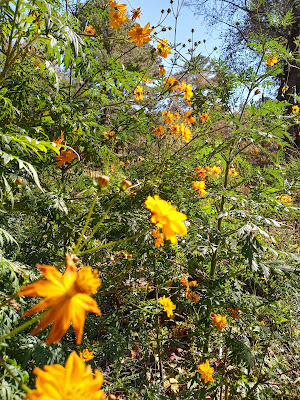This is the view from my kitchen window. The woodchip pile never got completely spread. Back in the spring, I waited for a rainy day and broadcast a bag of sketchy wildflower seeds that I picked up at Home Depot.
I knew it was a crapshoot whether anything at all would grow - there was no soil, per se, just some slightly decomposed wood chips.
Now, these flowers tower over my head and have been riot central for butterflies and bees all summer. Even now. The view from the street is ugly. My mission is to rid the area of stubborn shrubs and ivy (English and poison) and get a healthy variety of native wildflowers a better chance next year. These are Cosmos Sulphureus according to someone in a FB group I look in on.
I asked this group for advice about flowers that reseed themselves and thrive on neglect. I got the most amazing help and information. (I had to look up "yeeted" and a lot of other stuff! This is from a Weed Wizard:
"What we have here is the cutting-edge in soil science: A well-aerated static compost pile made of high carbon materials where a diversity of seeds has been yeeted upon it such that it has become covered with a diversity of photosynthesizing plants
Could the diversity of the high-carbon materials have been increased dramatically? Yes. Could the moisture level have been maintained better than complete neglect? Yes. Could the plants have been specifically chosen for the functions they perform, Yes? But did the plants grow? They did. Are there places where moisture and oxygen remain consistent? There are. That is some primo biology right there. Are there places like that that also enjoyed the continuous living root of a photosynthesizing host plant and its root exudates? Yes, there most certainly are places like that. Are there places like that that enjoyed the continuous exudation of a diversity of roots from different plant families intermingling? Maybe even so. Will any evergreens or living winter cover provide exudates that keep communities of exudate-dependent microbes and their symbionts thriving in populations high enough to bounce back quickly and mightily in early spring? They will! I second Donna's suggestion to introduce nitrogen to your compost pile with clover and its associated rhyzobia bacteria seed inoculant."
The whole group offered links to companies that sell native seeds just for zone 8B and other great resources.






















